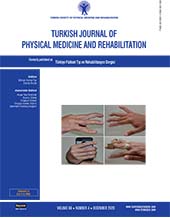Extracorporeal shock wave therapy as a conservative treatment option for carpal tunnel syndrome: A double-blind, prospective, randomized, placebo-controlled study
Patients and methods: Between April 2016 and March 2017, a total of 189 patients (22 males, 167 females, mean age 48.8±9.5 years, range, 24 to 70 years) with mild-to-moderate CTS were included in this double-blind, prospective, randomized, placebo-controlled study. The patients were divided into four treatment groups using stratified randomization: splint group (Group 1, n=47), splint+ESWT (Group 2, n=47), ESWT (Group 3, n=45), and splint+placebo ESWT (Group 4, n=50). All patients were evaluated at baseline, and one and three months. Pain using the Visual Analog Scale (VAS), finger pinch strength, Boston Carpal Tunnel Questionnaire (BCTQ), Leeds Assessment of Neuropathic Symptoms and Signs (LANSS), and electrophysiological examination were assessed.
Results: A total of 168 patients completed the study. There was no significant difference among the four groups in terms of age, sex, comorbid diseases, symptom duration, VAS-pain, BCTQ, and LANSS scores (p>0.05). Pain and functionality significantly improved in all groups (p<0.05). In the group with ESWT and using wrist splint combined, a greater improvement of the hand function and electrophysiological measures was observed.
Conclusion: Our study results show that ESWT is a valuable and reliable treatment modality for mild-to-moderate CTS.
Keywords : Carpal tunnel syndrome, high-energy shock waves, neuropathic pain

















